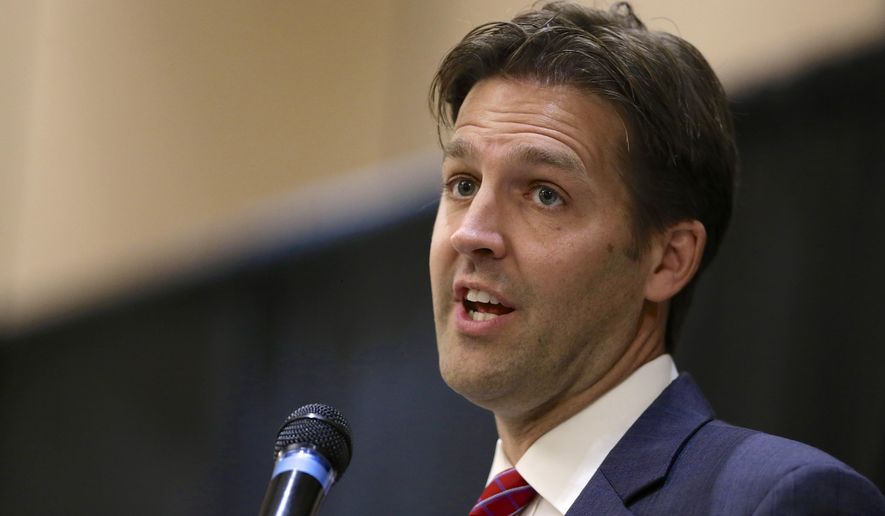Call it the year of the anti-endorsement. Many major Republican figures haven’t settled on whom they’re backing in the presidential primary, but they do know who they don’t want.
Iowa Gov. Terry E. Branstad drew attention to the phenomenon this month when he explicitly urged his state’s caucusgoers to reject Sen. Ted Cruz, saying the Texan’s antipathy toward ethanol would hurt the Iowa farmers whose corn is used to make the fuel additive.
This week, Sen. Ben Sasse, a Nebraska Republican, went to neighboring Iowa to campaign with three Republican hopefuls and said he was ready to appear with others — but not Donald Trump.
“I am not endorsing any candidate. I am urging conservatives to hold every candidate accountable to keeping their word so that we uphold the Constitution’s system of checks and balances. I’m pro-Constitution, and if that makes me anti-Trump, that’s Mr. Trump’s problem,” Mr. Sasse said in announcing his plans.
Major political figures usually shy away from poor-mouthing their party’s candidates because they might have to eat their words in a general election. In addition, there is Ronald Reagan’s 11th Commandment: “Thou shalt not speak ill of any fellow Republican.”
But this is anything but a normal primary season, and Reagan’s commandment has been honored in the breach as often as in the observance. Indeed, it has been almost as easy to get party officials to say which candidate they oppose as it is to find out which one they are backing.
Take the situation of former Sen. Bob Dole, a three-time presidential candidate who was the 1996 Republican nominee. He is backing former Florida Gov. Jeb Bush and signaling that he would be OK with Mr. Trump, but he has drawn far more attention for saying he can’t stand Mr. Cruz.
“I question his allegiance to the party,” Mr. Dole told The New York Times this month, predicting “wholesale losses” across the board in other races for Republicans if Mr. Cruz is at the top of the Republican ticket in November.
Iowa voters, who kick off the nominating contests with Monday’s caucuses, weren’t impressed with the phenomenon.
“I’d rather hear an endorsement than an anti-endorsement. It’s negative,” said Denis Diehm, 62, a retired seed production manager for Monsanto. “I don’t like negative campaigning. It just turns you off.”
Mr. Diehm, who remained undecided about whom to support in the caucuses, said attacks on candidates from the sidelines were undignified.
“It’s not the way you are supposed to run any type of business or any type of relationship,” he said.
Political scientists have long debated whether endorsements make a difference in voters’ choices — and anti-endorsements present a completely new wrinkle.
Thad Kousser, an associated professor at the University of California, San Diego, said political scientists have been able to measure some movement among voters based on endorsements but usually don’t keep lists of anti-endorsements.
What works for endorsements, he said, is repeatedly reminding voters about the backing of important, admired people. Campaigns spend their own money touting the backing of influential newspapers, labor unions and major figures.
“Nobody does that for the anti-endorsements,” he said.
Anti-endorsements go all the way back to the nation’s founding. When the 1800 election was thrown to the House of Representatives, Alexander Hamilton worked to ensure Aaron Burr wasn’t elected president, even though it meant the selection of Thomas Jefferson, who for years was Hamilton’s chief political enemy.
“Mr. Jefferson, though too revolutionary in his notions, is yet a lover of liberty and will be desirous of something like orderly government — Mr. Burr loves nothing but himself,” Hamilton wrote in a letter preserved in the Gilder Lehrman Institute of American History.
More recently, Barry Goldwater faced an anyone-but-Goldwater movement within the Republican Party in 1964, and George McGovern faced the same type of campaign within the Democratic Party in 1972, said Larry Sabato, a political scientist at the University of Virginia and head of the Center for Politics.
“Notice both anti-endorsement coalitions failed badly,” he said. “The reason these efforts are unsuccessful is that they come too late. The die is cast, but the establishment awakes and says, ’Are you kidding me?’ It pays to plan well ahead, stay alert and never simply assume a candidate you dislike can’t possibly win.”
Mr. Sabato said Mr. Branstad’s anti-endorsement aimed at Mr. Cruz appears to have had some effect on voters.
Speaking on MSNBC on Wednesday, the Iowa governor said he felt the need to inform voters about who he thought was best for the state’s economy.
“I just gave an honest answer to a very point-blank question,” he said.
His anti-endorsement didn’t sit well with all of his constituents.
“I don’t care what any of the governors say about anyone, especially Iowa’s governor. I don’t think they are in touch with the blue-collar guy who has to make a living for 10 or 15 bucks an hour,” said Matt Typa, 35, a truck wash supervisor. “What do they know?”
Mr. Typa is considering caucusing for Mr. Trump or Sen. Rand Paul.
• S.A. Miller reported from Iowa.
• Stephen Dinan can be reached at sdinan@washingtontimes.com.
• S.A. Miller can be reached at smiller@washingtontimes.com.




Please read our comment policy before commenting.